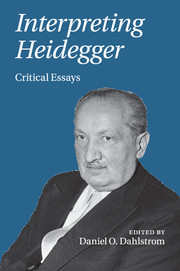Book contents
- Frontmatter
- Contents
- List of contributors
- Acknowledgments
- Method of citation and bibliography of Heidegger's works
- Introduction
- I Interpreting Heidegger's Philosophy
- 1 Heidegger's hermeneutics: towards a new practice of understanding
- 2 Facticity and Ereignis
- 3 The null basis-being of a nullity, or between two nothings: Heidegger's uncanniness
- 4 Heidegger's concept of freedom, 1927–1930
- 5 Ontotheology
- II INTERPRETING HEIDEGGER'S INTERPRETATIONS
- III INTERPRETING HEIDEGGER'S CRITICS
- Index
- References
1 - Heidegger's hermeneutics: towards a new practice of understanding
Published online by Cambridge University Press: 11 April 2011
- Frontmatter
- Contents
- List of contributors
- Acknowledgments
- Method of citation and bibliography of Heidegger's works
- Introduction
- I Interpreting Heidegger's Philosophy
- 1 Heidegger's hermeneutics: towards a new practice of understanding
- 2 Facticity and Ereignis
- 3 The null basis-being of a nullity, or between two nothings: Heidegger's uncanniness
- 4 Heidegger's concept of freedom, 1927–1930
- 5 Ontotheology
- II INTERPRETING HEIDEGGER'S INTERPRETATIONS
- III INTERPRETING HEIDEGGER'S CRITICS
- Index
- References
Summary
J (Japanese man): … Kuki merely stressed constantly that the term “hermeneutic phenomenology” was to indicate a new direction of phenomenology.
I (Inquirer/Heidegger): It may indeed have looked that way. In fact, however, I was concerned neither with a direction in phenomenology nor, indeed, with anything new. Quite the reverse, I was trying to think the nature of phenomenology in a more originary manner, so as to fit it in this way back into the place that is properly its own within Western philosophy
Martin Heidegger (GA 12: 90 f./OWL 9; tm).This essay examines Heidegger's hermeneutics. At first sight, an examination of this sort could appear to be a rather limited task. If we consider all of his writings, we have to acknowledge that Heidegger has in fact relatively little to say about hermeneutics. There is, to be sure, his early “hermeneutics of facticity,” outlined in rather broad strokes (and by no means fully thought through) in his early Freiburg lecture courses. But already a few years later, in Being and Time (1926), the concept of hermeneutics no longer seems to play a prominent role. Heidegger continues to lose interest in hermeneutics, one could further argue, in the years and decades after the publication of Being and Time. Given the significant shift during that time in his understanding of philosophy and the task of thinking, this development is hardly surprising.
- Type
- Chapter
- Information
- Interpreting HeideggerCritical Essays, pp. 15 - 41Publisher: Cambridge University PressPrint publication year: 2011
References
- 2
- Cited by

